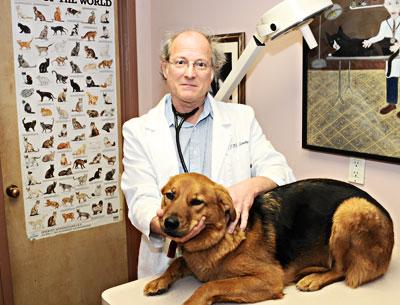Veterinarian Honored for Wildlife Work

Though he was unable to attend, Dr. Jonathan Turetsky, of the Evelyn Alexander Wildlife Rescue Center of the Hamptons, was honored with the Veterinarian of the Year award at the New York State Wildlife Rehabilitation Council conference held in Lake George on Oct. 6.
Popularly known as Wildlife Rescue, the center, which is in Hampton Bays, takes more than 10,000 calls per year in an around-the-clock, seven-days-per-week operation. Birds, deer, rabbits, turtles, squirrels — Dr. Turetsky has devoted his expertise and compassion to the East End’s wildlife for the past 25 years.
In lieu of attending, Dr. Turetsky wrote an essay that was read at the conference by Virginia Frati, executive director of Wildlife Rescue. In accepting the award, Dr. Turetsky cited humanity’s failure to recognize its place within nature and decried an “unrelenting attack on the resources of the Earth for the sole benefit of humankind.”
“I have come to understand that it is not our role to intervene in nature,” he wrote. “We have no business doing so. The relationships of animals to their environments and to each other have evolved over three billion years on this planet, and our human understanding of the complexity of this ecology is woefully inadequate. . . . All around us, fellow creatures are being destroyed by human activity.”
Examples cited in the essay include aquatic birds strangled by fishing line and suffocated in oil, turtles run over by automobiles, deer hit by cars and trapped in fences, and pesticides and other toxins ingested and passed up the food chain.
“We create a lot of havoc with the natural world, and I feel an obligation to try and do something to restore some of that,” Dr. Turetsky told The East Hampton Star during a rare free moment — in the late afternoon on New Year’s Eve — at his office on Goodfriend Drive in East Hampton. “It is something I think is giving back to the community because healthy natural-environment wildlife is an asset to the community, aside from its value in and of itself.”
Bearing witness to that havoc can be very frustrating, said Penny Moser, a rescue transport volunteer and member of the center’s board of directors. “What we do in the field is very hard work. There’s a lot of death involved and a lot of joy, but it’s a real thing. We’re really in the trenches in terms of seeing human cruelty and the suffering of fellow creatures.”
Dr. Turetsky, said Ms. Moser, is an inspiration to the entire staff and volunteers at Wildlife Rescue. “When you spend time with him, you feel that you can keep going because he’s just so pure and good and devoted. As a humanitarian, he’s the real deal — he includes all creatures in the ‘humanitarian’ aspect. He’s tireless, he’s very, very smart, has a wonderful sense of humor, and every person really admires him. He’s never discouraged, and that helps a lot,” she said.
Dr. Turetsky and his associates will often remain at the center late into the evening, awaiting transport of a wounded animal. “They’ve had a long day already and some live quite far away,” Ms. Moser said. “They’ll have a deer that needs surgery and they’ll stay, just out of the goodness of their hearts. You don’t see as much of that as you would like to anymore.”
Dr. Turetsky’s associates include Dr. Jennifer Katz and Dr. Darren Lippmann. “They work full time, and they do a lot of help with the wildlife also. Dr. Lippmann just fixed a bird’s broken wing,” Dr. Turetsky said.
“It’s impossibly small inside those feathers and quite a delicate thing to mend a wing, and a bird has to be 100 percent or you’re sending it to a certain death,” said Ms. Moser. Dr. Turetsky, she said, “has done some incredibly complicated surgeries, on any species I can think of. And of course, his colleagues [have] too.”
The conference, Dr. Turetsky said, was largely an educational meeting. “They have all sorts of programs for wildlife rehabilitators for caring about different types of species. It’s not a well-established science, there’s not a lot of research and money going into it. People have to learn from each other.”
Wildlife Rescue is a full-time companion-animal hospital, Dr. Turetsky said. In addition to the dogs and cats its veterinarians care for, they also look after a small herd of dairy cows in Bridgehampton. Caring for wildlife, he said, is mostly pro bono work.
He was a member of the first class of Tufts University’s School of Veterinary Medicine in 1983, after receiving his bachelor’s degree in agriculture and life sciences from Cornell University. He remained, for a time, in the Boston area, working at two animal hospitals and an emergency clinic, and also consulted for Boston’s Franklin Park Zoo before moving with his family to East Hampton.
Illness and injury, alas, never take a holiday. Dr. Turetsky and his staff’s services are needed literally every day of the year, and he admitted to an ever-present danger of burnout and despair. But, he wrote in his essay, “commitment and compassion must prevail. It was written in the Talmud, almost two thousand years ago, ‘You are not required to complete the task, yet you are not free to withdraw from it.’ ”
